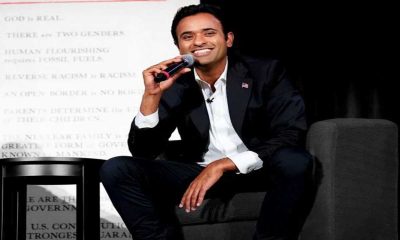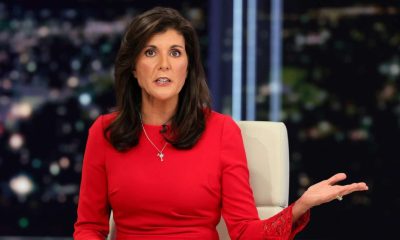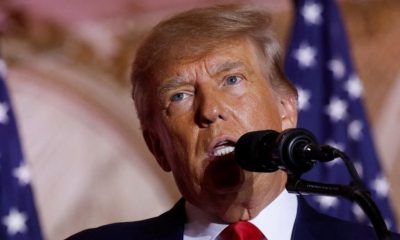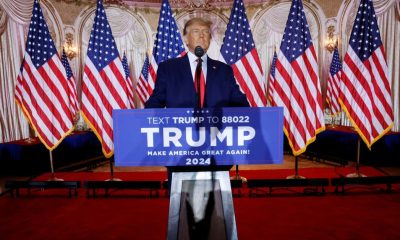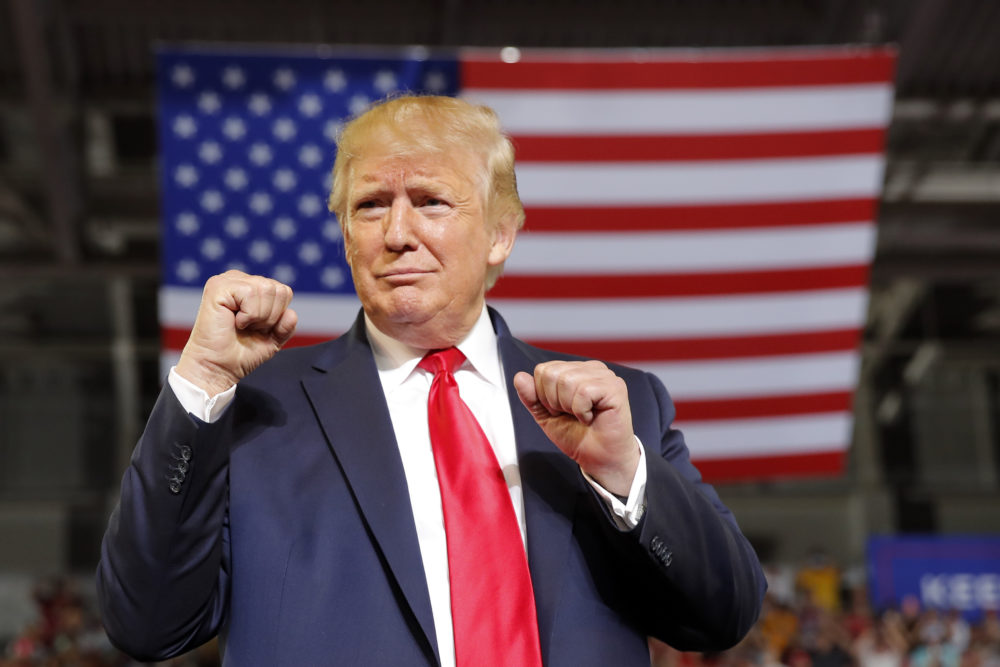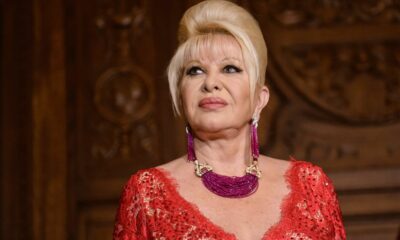Latest world news
Trump writes to NATO leaders to share defence cost
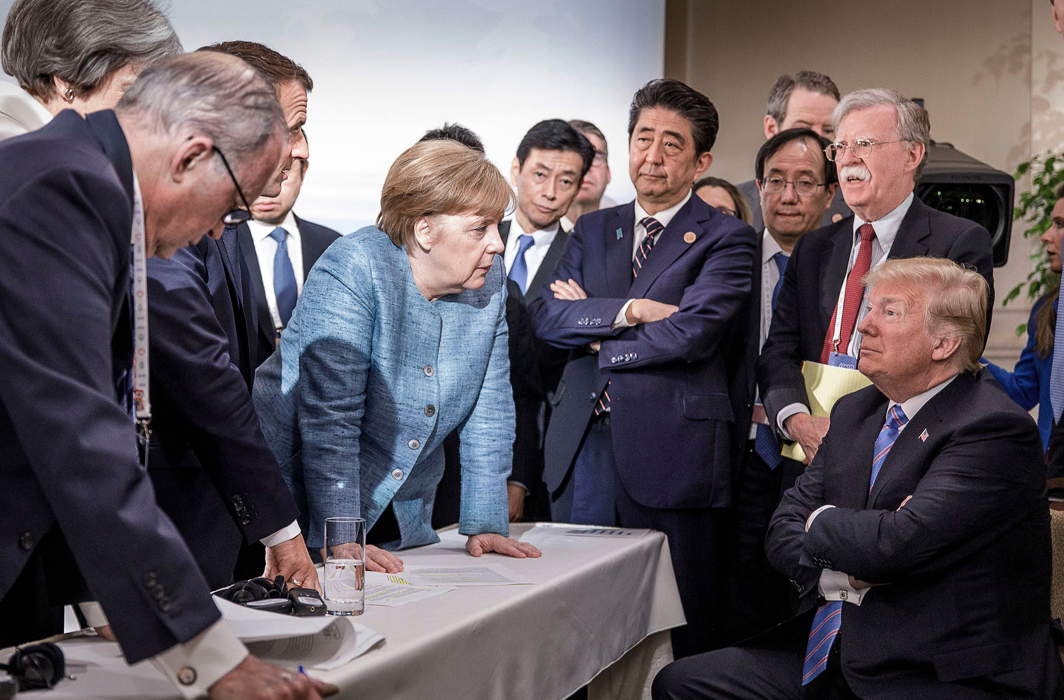
Continuing his “America First” populist move the US President Donald Trump has recently written sharply worded letters to the leaders of several NATO allies: including Germany, Belgium, Norway and Canada taking them to task for spending too little on their own defence and warning that the US is losing patience with their failure to meet security obligations shared by the alliance.
According to New York Times, the letters, sent in June, are the latest sign of acrimony between Mr. Trump and US allies as he heads to a NATO summit next week in Brussels.
While writing the letters to heads of the NATO states, Trump has repeatedly questioned it’s value and has claimed that its members are taking advantage of the US.
NYT journalist Julie Hirschfeld Davis says that Trump’s criticism raised the prospect of another confrontation involving the president and American allies after a blow-up by Trump at the G-7 summit last month in Quebec, Canada and increased concerns that far from projecting solidarity in the face of threats from Russia.
It further observed that the NATO meeting will highlight divisions within the alliance. Such a result could play into the hands of President Vladimir Putin of Russia, who is to meet with Trump in Helsinki, Finland, after the NATO meeting, and whose primary goal is sowing divisions within the alliance.
In his letters, the president hinted that after more than a year of public and private complaints that allies have not done enough to share the burden of collective defence, he may be considering a response, including adjusting the US’ military presence around the world.
In his letter to German Chancellor Angela Markel, Trump said, “As we discussed during your visit in April, there is growing frustration in the United States that some allies have not stepped up as promised. The United States continues to devote more resources to the defence of Europe when the Continent’s economy; including Germany’s, are doing well and security challenges abound. This is no longer sustainable for us. Growing frustration is not confined to our executive branch. The United States Congress is concerned, as well.”
Donald Trump’s complaint is that many NATO allies are not living up to the commitment they made at their Wales summit meeting in 2014 to spend 2 percent of their gross domestic product on national defence.
American presidents have long complained about the lack of burden-sharing by NATO member countries, but Mr. Trump has taken that criticism much further.
The NYT report says that Trump administration has been reportedly analyzing a large-scale withdrawal of American forces from Germany, after he expressed surprise that 35,000 active-duty troops are stationed there.
In his critical remarks to German Chancellor, Trump further said, “Continued German under-spending on defence undermines the security of the alliance and provides validation for other allies that also do not plan to meet their military spending commitments, because others see you as a role model.”
“It will, however, become increasingly difficult to justify to American citizens why some countries do not share NATO’s collective security burden while American soldiers continue to sacrifice their lives overseas or come home gravely wounded,” Mr. Trump wrote to Ms. Merkel.
He also wrote letters to Canadian PM Justin Trudeau, Norwegian PM Erna Solberg of Norway and Belgian PM Charles Michel, saying, he understands the “domestic political pressure” brought to bear by opponents of boosting military expenditures, noting that he has expended “considerable political capital to increase our own military spending.”
Meanwhile, CNN reports that White House has declined to comment on presidential correspondence.
However the National Security Council spokesman was quoted saying, “The President is committed to the alliance, as he has stated repeatedly. The President has also been clear we expect our allies to shoulder their fair share of our common defence burden and to do more in areas that most affect them. There is no better way to signal NATO’s resolve than for every ally to allocate the resources necessary to share their burden of our collective defence.”
During May 2017 NATO meeting Trump reportedly said, “Members of the alliance must finally contribute their fair share and meet their financial obligations, Twenty-three of the 28 member nations are still not paying what they should be paying and what they are supposed to be paying for their defence. This is not fair to the people and taxpayers of the United States.”
The North Atlantic Treaty Organization (NATO) is an intergovernmental military alliance between 29 North American and European countries. It constitutes a system of collective defence whereby its independent member states agree to mutual defence in response to an attack by any external party. Its headquarters are located in Brussels.
Latest world news
World Earth Day 2024: Google Doodle showcases aerial view of planet’s natural beauty
Google celebrated Earth Day 2024 with a special doodle featuring an aerial view of our planet’s biodiversity.
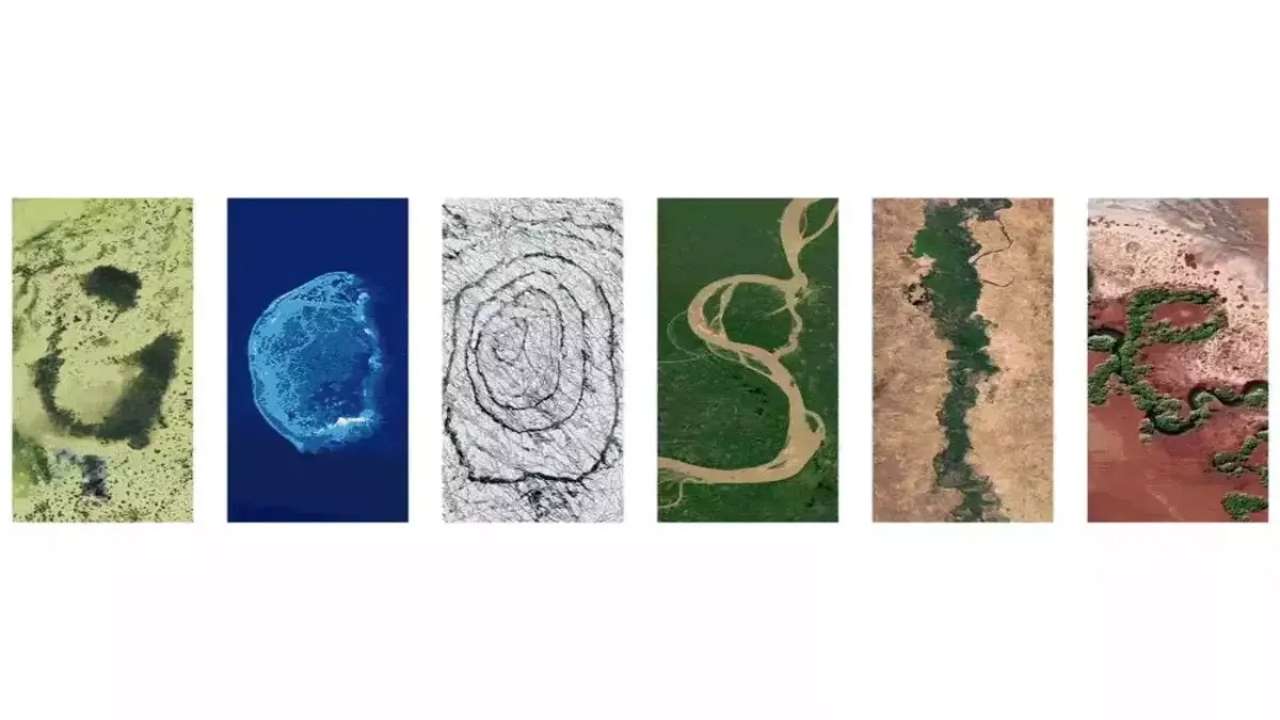
Google shared a doodle today to celebrate World Earth Day 2024, which showcased aerial photos of the planet’s biodiversity and natural beauty. Google reminded us of the importance of protecting planet earth for future generations with the help of this doodle.
The Google letters depict specific locations across the globe where people, communities, and governments work every day to help protect the planet’s natural beauty, biodiversity, and resources, according to the explanation of the annual Earth Day 2024 doodle on their website.
It said, these examples remind us that there’s much more to do to address the climate crisis and biodiversity loss, but also offer the promise of hope and optimism.
The islands of Turks and Caicos are represented by the letter “G.” The islands’ conservation efforts are concentrated on protecting important regions for biodiversity and addressing persistent environmental problems.
The largest reef in the southern Gulf of Mexico and a UNESCO biosphere reserve, Scorpion Reef National Park, is represented by the letter “O” in the Mexican flag.
The letter “O” features Iceland’s Vatnajokull National Park, which was designated as a national park in 2008 following decades of advocacy. The ecology within and surrounding the biggest glacier in Europe is safeguarded by this UNESCO World Heritage Site.
The letter “G” has the Jau National Park in Brazil on it. It is a UNESCO World Heritage Site and one of the biggest forest reserves in South America.
The Great Green Wall of Nigeria is represented by the letter “L,” and the Pilbara Islands Nature Reserves of Australia are represented by the letter “E.”
Meanwhile, Earth Day is a worldwide event that promotes protection of the environment every year. April 22 serves as a reminder of the importance of conservation efforts and sustainable practices to guarantee a healthier world and a brighter future.
The occasion inspires people across the world to come together and take action to protect the environment, strengthening our bonds with nature and promoting good change.
Latest world news
Bigg Boss 14 contestant Rahul Vaidya struggles walking in knee deep water, compares Dubai rains with Mumbai floods
Singer and TV personality Rahul Vaidya was recently stranded in the Dubai rains.

Rahul Vaidya, who was in Dubai ahead of his show which was scheduled to take place today, left the country due to heavy rains and reached Kolkata. The artist shared on social media his encounters in the UAE city, including challenges like walking through knee-deep water. Rahul provided an update regarding the heavy rainfall in Dubai on his Instagram profile.
The Bigg Boss 14 contestant revealed that he was in Kolkata and prepared to do an evening performance. Recalling the terrifying period he went through, Vaidya said there was a lot of confusion and panic in Dubai. The situation was similar to that when heavy floods hit Mumbai in 2005.
Vaiday also posted seval other images and videos of cars that were underwater and flooded roadways. The Bigg Boss 14 contestant, who shared his ordeal, claimed that even though it had just rained for two hours, the situation was dire.
In one of the video, which went viral he can be seen struggling in walking in knee-deep water. He can be also seen holding his sneakers in one hand and with other hand he was seen managing other things.
This is the result of the two hours of rain that it had, he can be heard saying in the video. Vidya also said he dosen’t believe Dubai is accustomed to a lot of rain. Everything had stopped working, he remarked.
After taking part in the first season of the singing reality show Indian Idol, Rahul Vaidya gained widespread recognition. In addition to Bigg Boss, he took part in Khatron Ke Khiladi 11.
Meanwhile, heavy rains that triggered flooding in the UAE and Bahrain, which left 18 people dead in Oman on Sunday and Monday, have paralyzed the financial hub of the Middle East, Dubai.
A lot of incoming flights were diverted from Dubai’s international airport because of the rain. At 7:26 p.m., the busiest airport in the world for foreign visitors stopped accepting new arrivals; a gradual resumption was announced for more than two hours later.
Images of planes navigating flooded tarmacs are making the rounds on social media.
According to pictures shared on social media, the flagship malls Dubai Mall and Mall of the Emirates both experienced heavy floods, while at least one Dubai Metro station had water up to the ankles.
There were several road collapses, severe flooding in residential areas, and numerous reports of leaks from windows, doors, and roofs.
Due to the unfavourable weather, schools around the United Arab Emirates were forced to close, and as more storms are predicted, the closures are anticipated to last until Wednesday. The government of Dubai allowed its staff to work remotely till this Wednesday.
Latest world news
Dubai sky turns green during storm in UAE, video goes viral
The UAE witnessed record-breaking rainfall on Tuesday and the National Centre of Meteorology recorded 254 mm of rainfall in less than 24 hrs in the Khatm Al Shakla area in Al Ain.

1 person was killed in UAE as it witnessed heavy rainfall on Tuesday, stranding commuters, flooding roads, disrupting trains and flights and resulting in water leakage from mall ceilings. The UAE witnessed record-breaking rainfall on Tuesday and the National Centre of Meteorology recorded 254 mm of rainfall in less than 24 hrs in the Khatm Al Shakla area in Al Ain. It is being said that the rainfall was the highest documented since the start of data collection in 1949.
The heavy rainfall in UAE came days after a similar situation in neighbouring Oman, where 13 people were killed in flash floods. Many parts of Oman saw torrential rains, which caused students to be trapped in buses and swept away motorists and trapped people in their homes.
Videos from Dubai circulating on social media showed widespread waterlogging on roads in Abu Dhabi, Dubai and other important cities. This left daily commuters in cars and other vehicles struggling to get back home. Dubai metro station too was seen flooded and closed.
One such video circulating on social media shows the aerial view of the city of Dubai from the top of a building. In the video the stormy winds are seen blowing over the city of Dubai. As the storm intensifies the Dubai sky turns green and ultimately gets covered by heavy rainfall. The video has gone viral on social media with more than 1.1 million views.
Another video showed water leakage from the ceilings of shopping malls, flooding the floors and destroying goods. A video which was shot in the famous Mall of the Emirates, showed pieces of ceiling falling as the rainwater gushed inside. Videos from many outlets of the Deira City Centre mall chain showed escalators being rendered unusable. Majid Al Futtaim, the company which owns the Mall of Emirates, said that the shopping complexes have been kept open and the customers are being sent away from the flooded areas.
-
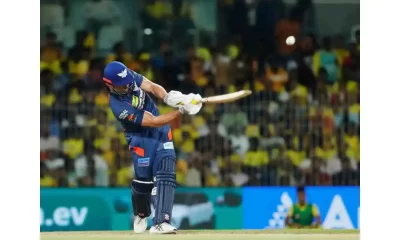
 Cricket news17 hours ago
Cricket news17 hours agoIPL 2024: Marcus Stoinis hits first IPL century as Lucknow Super Giants beat Chennai Super Kings by 6 wickets
-
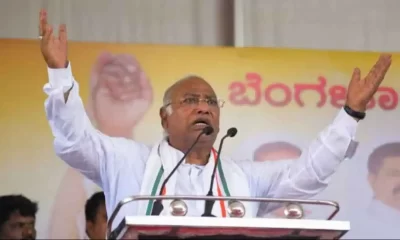
 2024 Lok Sabha Elections9 hours ago
2024 Lok Sabha Elections9 hours agoMallikarjun Kharge vows to continue politics till his last breath to defeat BJP
-
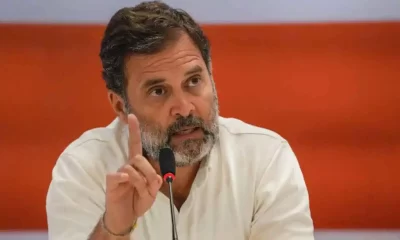
 2024 Lok Sabha Elections16 hours ago
2024 Lok Sabha Elections16 hours agoRahul Gandhi clarifies on wealth survey remark, says aim is to identify injustice
-
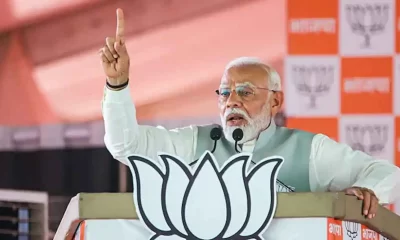
 2024 Lok Sabha Elections13 hours ago
2024 Lok Sabha Elections13 hours agoPM Narendra Modi slams Congress over Sam Pitroda’s inheritance tax remarks, accuses Congress of intending to impose higher taxes
-
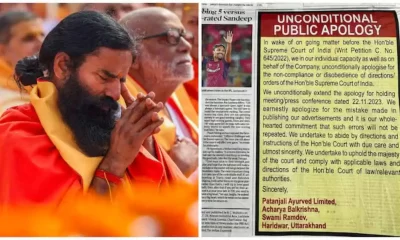
 India News15 hours ago
India News15 hours agoRamdev, Balkrishna publish bigger apology in newspapers after Supreme Court’s rap
-
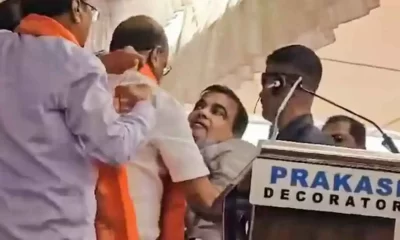
 2024 Lok Sabha Elections10 hours ago
2024 Lok Sabha Elections10 hours agoNitin Gadkari says he’s better now after collapsing at election rally in Maharashtra’s Yavatmal
-
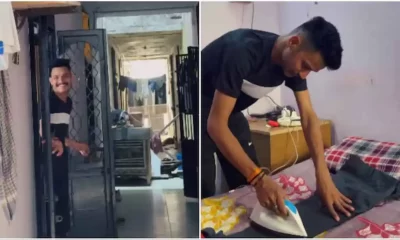
 Trending14 hours ago
Trending14 hours agoA waiter’s life: Social media users go emotional on watching viral video
-
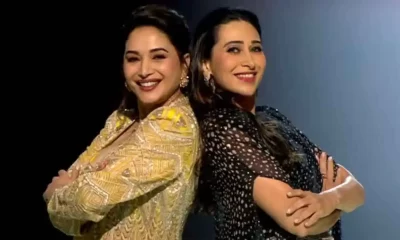
 Entertainment11 hours ago
Entertainment11 hours agoMadhuri Dixit, Karisma Kapoor recreate Dil To Pagal Hai dance battle on Dance Deewane


